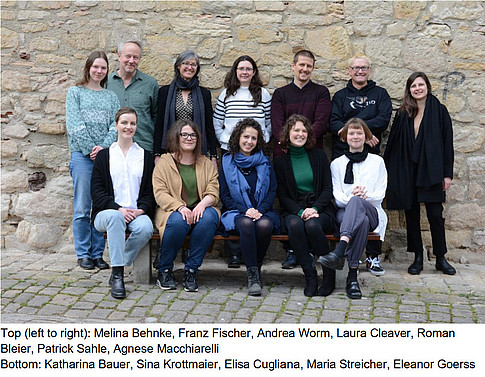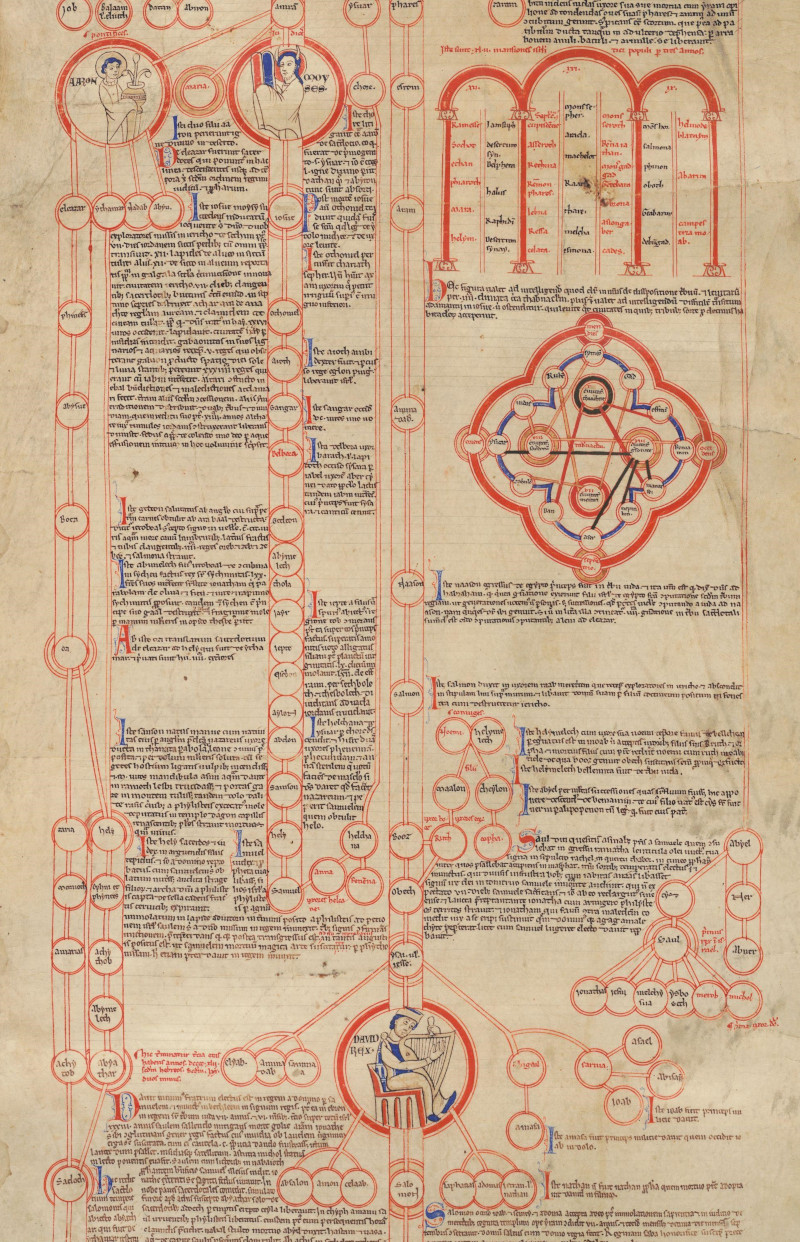History as a Visual Concept
Peter of Poitiers' "Compendium historiae"
This DFG-FWF-funded project, “History as a Visual Concept”, explores Peter of Poitiers’ twelfth-century diagrammatic work, the Compendium historiae in genealogia Christi. Ubiquitous throughout the mediaeval and early modern periods, the Compendium historiae’s graphic and pictorial elements gave it semantic and aesthetic power in the classroom, and beyond.
Peter of Poitiers' Compendium Historiae
Peter of Poitiers, a renowned scholar in Paris, originally designed the Compendium historiae as a tool to help his students learn the complexities of biblical history. He innovated a linear synopsis to visualise time, a graph designed so that synchronous and diachronic relationships of people and events can be read simultaneously. The sequence of generations from Adam to Christ forms a central axis, correlated with the lines of biblical families and other diagrams representing biblical events. The Compendium historiae clarifies the scientific and theological underpinnings of history, while providing a mnemonic tool to facilitate learning. Peter of Poitiers’ synopsis quickly spread throughout the Latin West. Over three hundred manuscript witnesses survive from the late twelfth to the early sixteenth centuries. Despite its prevalence, the Compendium historiae has neither been edited nor studied with regard to its graphics — a “metastructure” for the order of history.
Project Objectives
Researchers at the University of Tübingen, University of Wuppertal, and the University of Graz are creating the first digital edition of Peter of Poitiers’ Compendium historiae using the standard of the Text Encoding Initiative (TEI/XML), the International Image Interoperability Framework (IIIF) and Semantic Web technologies. This interdisciplinary and international research project brings together the fields of art history, mediaeval history, Latin philology, text editing, and digital humanities.
The aims are
- a comprehensive overview of the tradition of the Compendium historiae,
- an analysis of the graphic metastructure as well as the texts, diagrams and images embedded in it (recording variants),
- a critical scholarly edition,
- an investigation of socio-cultural context.
The project will result in
- a codicological database,
- a navigable visualisation of the graphic metastructure,
- a critical edition of the text,
- publications and lectures regarding individual case studies of manuscript witnesses, socio-cultural context, and other aspects of the tradition.
Digital and freely accessible, our digital edition will break new methodological ground with graphic and textual elements displayed in a navigable graph. In making accessible one of the most visually innovative and influential works of the Middle Ages, our project will shed new light on the history of the visualisation of knowledge.
Project Team
Art History and Manuscript Studies
Kunsthistorisches Institut, Eberhard Karls Universität Tübingen und School of Advanced Study, University of London
- Prof. Dr. Andrea Worm
- Dr. Laura Cleaver (School of Advanced Study, University of London, Mercator Fellow)
- Dr. Eleanor Goerss (postdoc researcher)
- Maria Streicher (praedoc researcher 2/2023-9/2023, 10/2024-)
- Katharina Bauer (praedoc researcher 9/2023-)
- Melina Behnke (student assistant, 2/2023-10/2023)
- Annabelle Berghof (student assistant, 1/2024-8/2024)
Editorial Sciences
Fakultät für Geistes- und Kulturwissenschaften, Bergische Universität Wuppertal
- Prof. Dr. Patrick Sahle
- Dr. Elisa Cugliana (postdoc researcher, 2/2023-10/2023)
- Andreas Mertgens (postdoc researcher, 1/2024-)
- Lennart Rouxel (student assistant, 2/2023-)
- Lukas Schievelbusch (student assistant, 1/2024-)
- Johannes Ioannu (research intern, 2/2024-7/2024)
Medieval Latin Philology
Venice Centre for Digital and Public Humanities, Università Ca’ Foscari Venezia
- Prof. Dr. Franz Fischer (Mercator Fellow)
- Dr. Agnese Macchiarelli (postdoc researcher, Bergische Universität Wuppertal, Fakultät für Geistes- und Kulturwissenschaften – Geschichte / Ca‘ Foscari University of Venice, Department of Humanities – Venice Centre for Digital and Public Humanities)
Information Modeling and Publication
Center for Information Modeling, University of Graz
- Dr. Roman Bleier
- Sina Krottmaier (praedoc researcher, 4/2023-)
- Jakob Sonnberger (technician, 9/2023-)
- Teresa Potenza (05/06 2023, Erasmus+ Internship)
- Michele Potenza (05/06/07 2024, Erasmus+ Internship)


Mag. Roman Bleier MA PhD
FWF Project lead +43 316 380 - 5772
Elisabethstraße 59/III, 8010 Graz
ORCID: 0000-0003-4674-1042
https://homepage.uni-graz.at/de/roman.bleier/
